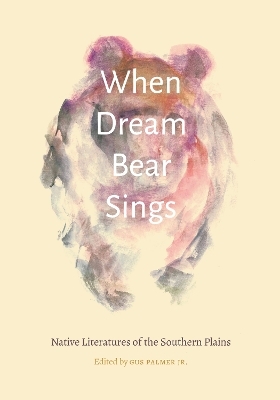
When Dream Bear Sings
University of Nebraska Press (Verlag)
978-0-8032-8400-5 (ISBN)
Although the canon of nineteenth-century Native American writers represents rich literary expression, it derives generally from a New England perspective. Equally rich and rare poetry, songs, and storytelling were produced farther west by Indians residing on the Southern Plains. When Dream Bear Sings is a multidisciplinary, diversified, multicultural anthology that includes English translations accompanied by analytic and interpretive text outlines by leading scholars of eight major language groups of the Southern Plains: Iroquoian, Uto-Aztecan, Caddoan, Siouan, Algonquian, Kiowa-Tanoan, Athabaskan, and Tonkawa.
These indigenous language families represent Indian nations and tribal groups across the Southern Plains of the United States, many of whom were exiled from their homelands east of the Mississippi River to settlements in Kansas and Oklahoma by the Indian Removal Act of the 1830s. Although indigenous culture groups on the Southern Plains are complex and diverse, their character traits are easily identifiable in the stories of their oral traditions, and some of the most creative and unique expressions of the human experience in the Americas appear in this book. Gus Palmer Jr. brings together a volume that not only updates old narratives but also enhances knowledge of indigenous culture through a modern generation’s familiarity with new, evolving theories and methodologies regarding verbal art performance.
Gus Palmer Jr. (Kiowa) is an associate professor of anthropology and Native American studies at the University of Oklahoma, specializing in linguistic anthropology. He is the author of Telling Stories the Kiowa Way.
List of Illustrations
Foreword
Alan R. Velie
Acknowledgments
Introduction
1. Algonquian Language Family
Cheyenne
Cheyenne Stories and Storytelling Oral Traditions
Gordon Yellowman
The Bear and the Coyote
Translated by Joyce Twins
Cheyenne Story—Dogs Used to Carry Burdens in Days before Horses
Birdie Burns, Cheyenne
Recorded and transcribed by Julia A. Jordan
Cheyenne Story—Man Who Prophesied Coming of Horses and White Men Long Ago
Birdie Burns, Cheyenne
Recorded and transcribed by Julia A. Jordan
How Stories Were Told at Night by an Old Lady
Birdie Burns, Cheyenne
Recorded and transcribed by Julia A. Jordan
Birdie’s Grandmother’s Story of How Corn and Buffalo Were Given to the Cheyennes
Birdie Burns, Cheyenne
Recorded and transcribed by Julia A. Jordan
Absentee Shawnee
Shawnee Poems
Narrated by Pauline Wahpepah
Introduced by Gus Palmer Jr.
Kickapoo
The Motorcyclists
Mosiah Bluecloud
Lenape
The Lenape Story of the Origin of the Woman Dance
Lillie Hoag Whitehorn
Transcribed by Bruce Pearson and James Rementer
Translated by Nora Thompson Dean
Introduced by James Rementer
Miami
Myaamia “Story of Fox and Wolf”
Narrated by Kiišikohkwa (Elizabeth Valley) to Albert Gatschet
Introduced by David J. Costa
Potawatomi
Pondese: Old Man Winter and Why We Have Spring Today
Translated and introduced by Justin Neely
2. Athabaskan Language Family
Plains Apache
Coyote and Rock Monster: A Plains Apache Tale
Narrated by Alonzo Chalepah Sr.
Transcribed by Harry Hoijer
Reanalyzed and introduced by Sean O’Neill
3. Caddoan Language Family
Caddo
The Wolf and the Wren
Narrated by Sadie Bedoka Weller
Transcribed by Wallace Chafe
Pawnee
The Old Woman and Her Grandson Blessed by a Voice
Narrated by Dollie Moore, Pitahawirata Pawnee
Translated and introduced by Douglas R. Parks
Interlinear files by Joshua A. Richards
He Goes Over and the Burning Log: A Wolf Story
Narrated by Harry Mad Bear, Skiri Pawnee
Introduced and translated by Douglas R. Parks
Interlinear files by Joshua A. Richards
A Pawnee Story
Narrated, translated, and introduced by Adrian Spottedhorsechief
Arikara
The Race between the Horse and the Buffalo: An Arikara Narrative
Alfred Morsette (Paatú Kananuuninó, ‘Not Afraid of the Enemy’)
Transcribed and introduced by Douglas R. Parks
Kitsai
Coyote Frees Buffalo
Narrated by Kai Kai, Kitsai
Recorded by Alexander Lesser
Translated and introduced by Joshua A. Richards
Wichita
Awa:hárikic: Hassí:ri:ha:stírih
Narrated and translated by Bertha Provost
Translated and introduced by David S. Rood
4. Iroquoian Language Family
Cherokee
Diary
Translated and introduced by Durbin Feeling
I Shot It, You Shot It
Transcribed and translated by Durbin Feeling
Seneca-Cayuga
Minnie Thompson Stories
Narrated by Minnie Thompson
Recorded and transcribed by J. W. Tyner
Wyandotte
History of the Wyandotte Indians
Donna Elliott Vowel interviewed by J. W. Tyner
5. Kiowa-Tanoan Language Family
Kiowa
Já̱:mátàunhè̱:jègà (Star Girls Story)
Narrated, transcribed, and translated by Parker P. McKenzie
Retranslated and introduced by Gus pàntha̱i:dê Palmer
6. Siouan Language Family
Ponca
A Ponca Ghost Story
Narrated by Francis La Flesche
Originally transcribed and translated by James Owen Dorsey
Reanalyzed and introduced by Sean O’Neill
Otoe-Missouria
Introduction to Otoe-Missouria
Sky Campbell
The Rabbit and the Grasshoppers: An Otoe Story
Collected by Rev. James Owen Dorsey
The Rabbit and the Mountain: An Otoe Myth
Narrated by Joseph La Flesche
Collected by Rev. James Owen Dorsey
Ponca Omaha
Ponca Omaha Letters Dictated and Taken by James Owen Dorsey
Introduced by Vida Woodhull Stabler
To the Cincinnati Commercial, from several Omahas
Part 1, written by Dúba-Moⁿthiⁿ
Part 2, written by Káxe-Thoⁿba
Part 3, written by Óⁿpʰoⁿ-toⁿga
Part 3, written by Óⁿpʰoⁿ-toⁿga
Part 3, written by Óⁿpʰoⁿ-toⁿga
Part 6, written by Káxe-Thoⁿba
Kaw
Two Accounts of a Battle between the Kaws and Cheyennes
Narrated by Zhóhiⁿ Máⁿyiⁿ and Paháⁿle Gáxli
Collected by Rev. James Owen Dorsey
Retranscribed, retranslated, and introduced by Justin T. McBride
Ioway
The Sister and Brother
Translated and introduced by Lance Foster, THPO Iowa Tribe of Kansas and Nebraska
Quapaw
Introduction to Quapaw
Billy Proctor
The Rabbit and the Black Bears: A Dhegiha Myth
Narrated by Alphonsus Valliere
Recorded by James Owen Dorsey
Transcribed by Billy C. Proctor
7. Uto-Aztecan Language Family
Comanche
Blind Fox and Two Girls
Narrated by Mow-wat
Translated by Juanita Pahdopony
Introduced by Brian Daffron
The Boy Who Turned Into a Snake
Narrated by Dorothy Martinez
Translated by Juanita Pahdopony
Introduced by Brian Daffron
8. Language Isolate
Introduction to Language Isolates
Gus Palmer Jr.
Tonkawa
The Young Man Who Became a Shaman: A Tonkawa Myth Story
Transcribed, translated, and introduced by Don Patterson
Text prepared by Miranda Allen Myers
Contributors
Index
| Erscheinungsdatum | 27.10.2018 |
|---|---|
| Reihe/Serie | Native Literatures of the Americas and Indigenous World Literatures |
| Zusatzinfo | 1 illustration, 1 map, index |
| Verlagsort | Lincoln |
| Sprache | englisch |
| Maße | 178 x 254 mm |
| Themenwelt | Literatur ► Anthologien |
| Geschichte ► Teilgebiete der Geschichte ► Kulturgeschichte | |
| Sozialwissenschaften ► Ethnologie | |
| Sozialwissenschaften ► Soziologie | |
| ISBN-10 | 0-8032-8400-4 / 0803284004 |
| ISBN-13 | 978-0-8032-8400-5 / 9780803284005 |
| Zustand | Neuware |
| Haben Sie eine Frage zum Produkt? |
aus dem Bereich


